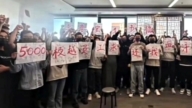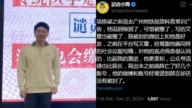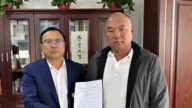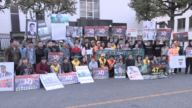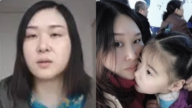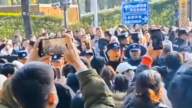【新唐人2013年05月17日訊】大陸一名安徽籍女大學生在南京應聘時,因戶籍不是本地的而遭到拒絕,女大學生一怒之下將用人單位告上法庭,成為中國戶籍就業歧視第一案。
據《自由亞洲電臺》報導,就讀法律專業的2013年應屆女大學畢業生蘇敏(化名),到南京市人力資源社會保障局應聘一個普通的話務員職位,卻因為戶籍是安徽省不是南京本地而遭到拒絕。蘇敏在投訴無果的情況下,在5月13號委託律師將南京人力資源社會保障局以戶籍就業歧視為由告上法庭,並要求被告賠禮道歉,並賠償相關損失。
東莞打工者曹先生:「中國這個戶籍是一大罪惡啊,它限制了公民非常多的基本權利,一個省到另外不同的一個省,你就好像二等公民一樣,不能跟當地人享受平等的權利,你就業的話,你去找一些私營企業,一些單位還是可以的,你別想參加公務員啊,當地政府機關工作,政府機關工作人員都是本地人把控的,我們外地人根本不可能進去的。」
據了解,中國就業歧視五花八門,包括戶籍、學歷、學校、膚色、年齡、殘障、婚姻狀況、語言、財產等等就業歧視。但據某調研小組在北京市、河北省、河南省、浙江省、重慶市5省市調查結果表明,戶籍就業歧視是最嚴重的就業歧視之一,不僅表現在一些企業招聘過程中,在事業單位和國家機關公務員招考和招聘中尤為如此。在遭遇過戶籍歧視的青年中,有57.9%是農村戶口,有78.9%是非本地戶口﹔而在北京地區的調查中,非本地戶口求職遭拒絕的比例,達到了驚人的93.9%。
原《河北人民廣播電臺》編輯朱欣欣:「因為中國真正的市場經濟沒有完全市場化,很多行業、領域都是被各地的地方保護啊,設置很多很多的限制。當地為了考慮到當地的一些社會、經濟各方面,首先滿足本地的勞動力、就業安排。它不願意放開就在這兒,關鍵是有很多都是地方保護主義。都是各地分割自己的勢力範圍。」
大陸戶籍歧視體現在就業上還只是冰山一角,在就學、買房、辦理保險,甚至辦理銀行業務等方面都有嚴重的戶籍歧視。
東莞打工者曹先生:「再一個,子女上學的問題,我們在這生活、工作十多年,還是二等公民,子女不能享受公辦教育,只能享受民辦教育,每年花要很多錢上學。外地工人子女上學,百分之八、九十都是上民校的。 」
有學者指出,目前中國的戶籍制度,比國民黨甚至北洋軍閥時期的戶籍制度都要落後,而戶籍歧視已經成為過街老鼠,眾矢之的。
朱欣欣:「很嚴格的戶籍制度是共產黨執政以後進行的,它遠遠的不能滿足現在人們這種要求,應當及早廢止。一開始,中共建立戶籍制度,一個是便於它對民眾的統治,因為戶籍制度嚴格限制人們自由的遷徙,也便於對人進行控制,戶籍制度同時城鄉二元的結構,造成了農民和城鎮居民不同的待遇,現在戶籍制度遭到大家的一致反對。」
對於南京戶籍就業歧視案,深圳作家朱建國在接受《自由亞洲電臺》採訪時表示, 不管法院最終能否受理此案,在目前的中共體制下,戶籍就業歧視問題是不可能解決的,即使最終勝訴也沒有意義,因為這種案例,不會被當局允許推廣。
採訪/田淨 編輯/張天宇 後製/李智遠
China’s First Lawsuit on Hukou Discrimination in Employment
A female college graduate was turned down for a job offer
for not having a local Hukou (permanent resident status).
In a rage, she took legal action against the employer.
This has become the first case of Hukou discrimination
in employment in China.
Radio Free Asia has reported that a fresh college graduate
was rejected for a position by the Labor & Social Security Bureau in Nanjing.
The reason for the rejection was that she has no local Hukou.
The graduate filed complaints but has failed
to get any response from the bureau.
On May 1 3, her lawyer sued the labor administration
for its Hukou discrimination.
The lawsuit has demanded an apology and
compensation for losses.
(Migrant workers, Dongguan) Mr. Cao:
“The existence of the Hukou system is really very wrong.
It limits so many civil rights in China. Without local Hukou,
you lose the equal rights that local residents have.
In job hunting, some private employers may still
consider your job applications if you haven’t local Hukou.
But this is absolutely impossible for civil service positions.
Local state agencies are the turf of local people,
there’s no chance of acceptance for non-locals.”
It is known that there is a wide variety of
reasons for employment discrimination in China.
It involves aspects of Hukou status, academic degree,
race, age, handicaps, marital status, among others.
An official survey was conducted in five provinces,
in Beijing, Hebei, Henan, Zhejiang and Chongqing.
It showed that Hukou discrimination is one of
the most serious forms of discrimination in employment.
This is especially true in civil service recruitment.
Among those who suffer Hukou discrimination,
nearly 60% have been rural residents,
about 79% have been non-local residents.
In Beijing, the job rejection rate for those
non-local job seekers are as high as 93.9%.
(Former editor, Hebei state radio station) Zhu Xinxin says:
“China hasn’t developed any real market economy.
Many sectors are subject to local protectionism.
Local authorities only care about their performance appraisal.
They usually keep job positions for local residents,
instead of making them open to non-local citizens.
Local protectionism plays a key role in this issue.
Each region has its own divided power and influences.”
Hukou discrimination affects nearly every aspect of
people’s lives in China.
The impact on employment is only the tip of the iceberg.
It can affect people in their school education, buying homes,
in their eligibility for insurance benefits
and in their access to banking services.
(Migrant worker, Dongguan) Mr. Cao:
“Another issue is children’s school education.
We’ve lived and worked here for over a decade,
but have been treated like second-class citizens.
Our children are banned from attending state schools.
They have to seek education at private migrant schools,
which costs us so much each year.
Among the migrant workers’ children,
over 80% attend private migrant schools.”
Some scholars have said that China’s existing
household registration system is more backward than
the system in use during the reign of Kuomingtang
and during the Beiyang Warlord period.
Hukou discrimination has now become
a target of public criticism.
Zhu Xinxin: “The Hukou system started after
the Chinese Communist Party(CCP) took power.
It should be abolished for not fitting in with today’s society.
The CCP set it up to facilitate its control over the people.
The Hukou system strictly limits migration,
and divides the population into rural and urban residents.
It has been uniformly opposed by the public.”
The RFA report has quoted writer Zhu Jianguo.
He said that no matter whether the court accepts the lawsuit
or not, Hukou discrimination for employment has no solution.
Even winning the lawsuit is pointless,
as it won’t be recognized by the authorities.


